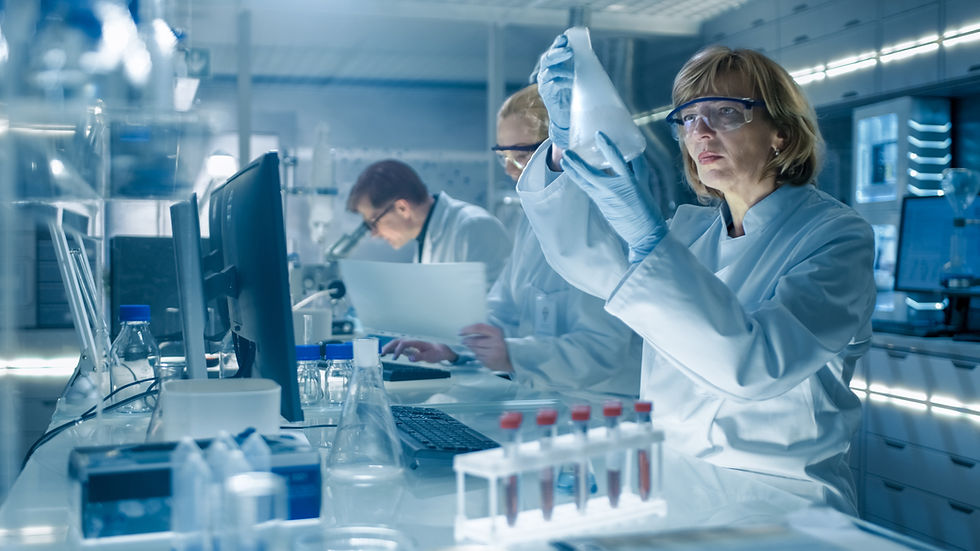Choosing Sciences in High School doesn't LIMIT you to becoming a Doctor
- careercourtsb
- Dec 2, 2023
- 5 min read
When thinking of a career in science, many automatically think of roles in the medical field, ie. a doctor or nurse. However, the world of science offers a vast array of lucrative and rewarding career opportunities beyond the realm of medicine.
In this blog, we will delve into 13 diverse career paths for students that take science classes in high school to explore.
1) Machine Learning Engineer

Roles & Responsibilities: A Machine Learning Engineer is a proficient programmer who researches, designs, and creates software to automate systems. They analyze the algorithms of machine learning to fix various issues. Their primary role is to explore and visualize data, verify and ensure the data quality by data cleaning, oversee the data acquisition process, and identify differences in the distribution of data.
Requirements: A Machine Learning Engineer requires a bachelor's or a master's degree in computer science or any related field.
2) Geologist

Roles & Responsibilities: A Geologist is a specialist who studies the history, nature, and matters of the Earth (eg. its different layers) including other celestial bodies and their processes of making. They work outdoors to collect soil, rocks, and different samples. In laboratories, they test and observe the collected samples. Most geologists work in the extraction of oil and gas and plan the mining of coal, minerals, metals, and other ores
Requirements: To become a Geologist, you can pursue Earth sciences in your bachelor's and master's.
3) Physicist

Roles & Responsibilities: A Physicist is a scientist who studies all the aspects of matter and energy. They research and explore the laws of nature and use their knowledge of physics to advance the world and living by developing technologies. A physicist performs experiments and mathematical operations to analyze and formulate laws related to matter, space, time, and energy.
Requirements: You can pursue a bachelor's or master's degree in physics or a related subject to become a Physicist.
4) Data Analyst

Roles & Responsibilities: A Data Analyst gathers scattered data and analyses and organises that data to get a meaningful result. They develop and implement databases and data gathering systems. Their primary role is to identify, analyze, and interpret the data trends and patterns from a complex set of data. They use statistical techniques and various data analysis tools to extract insightful data and develop business strategies.
Requirements: A Data Analyst requires advanced knowledge of multiple data analysis tools and statistics, maths and communication skills. You can opt for computer modelling, analytics or related subjects in your bachelor's or master's to become a data analyst.
5) Chemist

Roles & Responsibilities: A Chemist is a scientist who examines chemicals, their properties, and reactions. They analyse different chemical substances, including organic and inorganic compounds. They perform experiments with chemical substances to understand their behavior, develop new compounds, or improvise existing products. Their primary roles include quality control checks on the chemical experiments and preparing reports on the findings and conclusions of the test and analysis. They work in controlled environments such as laboratories to experiment with chemicals.
Requirements: To become a Chemist, you can get a bachelor's or master's degree in chemistry.
6) Software Engineer

Roles & Responsibilities: A Software Engineer develops various software for daily uses. They use their knowledge of software engineering to plan, design, develop, and manage software programming applications. Their roles include developing, testing, and maintaining computer software of everyday use from various tools to web browsers. They apply principles of software engineering for debugging and to solve other software-level issues. Almost all industries, including medical, education, financial, and other technical industry require software engineers. Software engineers usually work with other developers and engineers.
Requirements: You can earn a BTech degree in the software engineering field to become a Software Engineer.
7) Research Scientist

Roles & Responsibilities: A Research Scientist plans, conducts, and controls experiments in a varied range of areas. They analyse and extract information from gathered data. They work in laboratories, do trials and investigations, and carry out experiments based on collected data and resources to reach meaningful conclusions and findings. Their primary responsibilities include planning and guiding various research experiments and presenting their findings to stakeholders. They also write papers and publish journals.
Requirements: To become a Research Scientist, you need a doctorate degree in any science field of your interest.
8) Web Developer

Roles & Responsibilities: A Web Developer is a professional who plans, designs, and develops websites using various technologies. Some of the technologies they use are hypertext markup language (HTML), cascading style sheets (CSS), hypertext preprocessor (PHP), and JavaScript. They focus on the technical side of a website, such as a server, storage, functionality, and performance. They are responsible for managing and maintaining websites, fixing website issues, and monitoring website traffic.
Requirements: You require knowledge of website development and content management systems (CMS) or programming languages to become a Web Developer.
9) Veterinarian

Roles & Responsibilities: A Veterinarian or a Vet provides treatment to pets, livestock, and other animals. They examine and diagnose the health issues in animals and perform surgeries on them. Their responsibilities include testing and treating diseases and injuries in animals, prescribing medicines, and vaccinating them. They provide consultations to pet owners about pet cares and give other related advice. The workspace of vets is animal hospitals, animal shelters, farms, laboratories, zoos, and aquariums.
Requirements: To practice as a vet, you require a degree in veterinarian science.
10) Pharmacist

Roles & Responsibilities: A Pharmacist is a medication expert who knows how to compound, use, store, and prescribe medicines to ensure the lawful supply of medicines. They prepare medicines, considering therapeutic incompatibilities, and provide information about medicines to healthcare professionals. Their responsibilities include monitoring medicinal therapies, suggesting improvisations, and controlling medications.
Requirements: To practice as a Pharmacist, you need a bachelor's degree in pharmacy.
11) Medical Officer

Roles & Responsibilities: A Medical Officer oversees medical facilities provided to the patients and other daily operations of the hospitals. They supervise healthcare programs and medical trials and are involved in various medical researches. Their primary responsibilities are to monitor the quality of care provided to patients, advise healthcare staff for efficient functioning, coordinate with doctors, and communicate with administration and directors for improvement of the facilities, hospital functioning, and other related concerns.
Requirements: To become a Medical Officer, you need an MBBS degree or degree in doctor of medicine.
12) Environmental Engineer

Roles & Responsibilities: Environmental Engineers work to protect environments and people from adverse environmental effects (eg. controlling pollution). Their main concern is to protect public health by protecting and improving environmental conditions. They develop renewable sources of energy and find solutions to optimise the use of natural resources.
Requirements: You require a bachelor's degree in environmental engineering or a related field to become an Environmental Engineer.
13) Agronomist

Roles & Responsibilities: An Agronomist is a scientist who works on soil and crops to improve the quality and yield of crops. They ensure the maximum yield without affecting the soil quality. They conduct research and experiments to discover a new or improved variety of crops concerning the quality, yield, nutrition, resistance, and soil and climate adaptation. Their roles include finding the best and economical ways of crop production along with overseeing plant breeding and weed/pest management.
Requirements: You require a degree in the agricultural field to become an Agronomist.
In conclusion, a career in science is lucrative, rewarding, innovative, and challenging for most people. It presents opportunities to continually expand and elevate your knowledge, fostering a deeper understanding of your surroundings and the people around you. Exploring the various science-related careers will equip you with the insights needed to make informed decisions about your professional journey.
Thank you for reading! We are awaiting for your feedback!




Comments